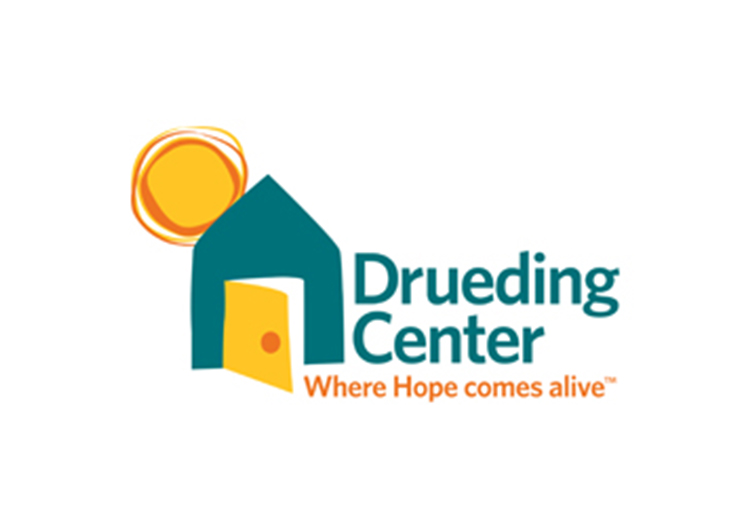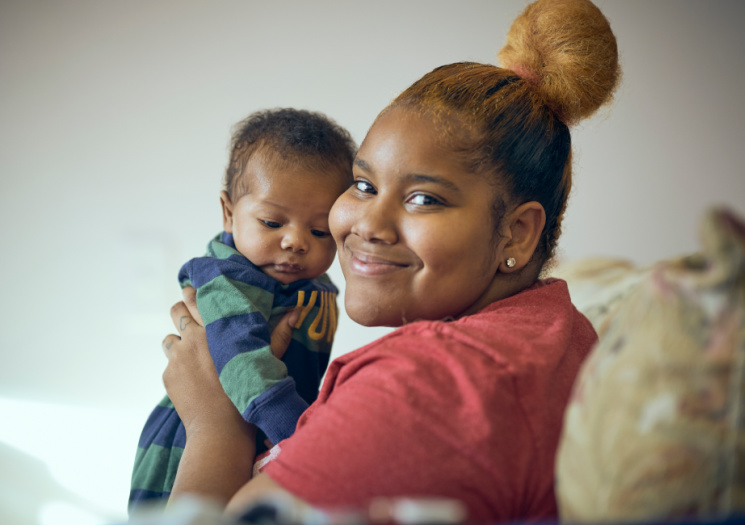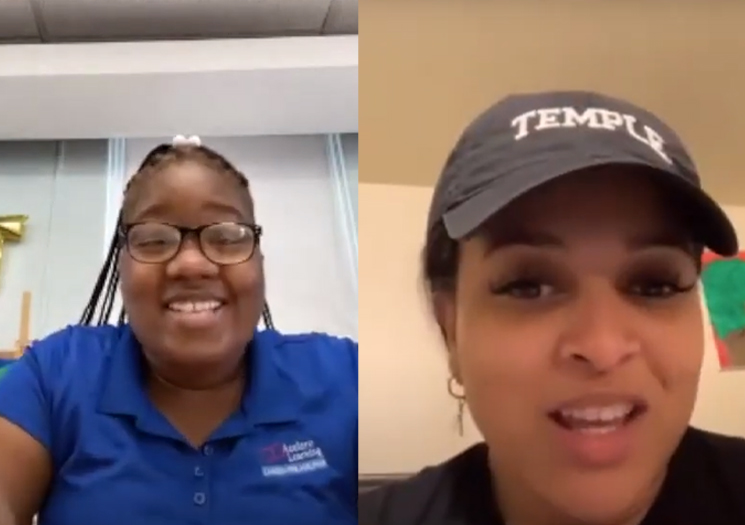- Find a Provider
-
Services
-
Redeemer Health provides compassionate care across every stage of life.
- View all Services
- Health Care
- Cancer Care
- Heart Care
- Hospital at Home
- Maternity Care
- Infusion Therapy Center
- More Health Care Services
-
- Patients & Visitors
- Locations
- Careers
Harnessing Technology to Strengthen Families
March 22, 2021
categories:

In a four-story, 90-year-old stone building in North Philadelphia, the staff at Drueding Center, Redeemer Health’s transitional housing program for young families experiencing homelessness, are quietly changing lives.
The top three floors house 30 families who need support to heal from trauma, restore hope, and end homelessness. Each is assigned a Family Advocate, who provides intensive case management and works with families to develop goals around housing, education, employment, health, and life skills.
Drueding Center is unique among organizations of its kind in that it offers a licensed, NAEYC accredited childcare on site and provides After Care services to families for up to seven years after they move into permanent housing.
Resourceful Solutions Combat COVID-19 Challenges
Programming for residents is a critical part of continuing their healing process. It is an essential part of Drueding Center’s residential program, not only for sharing information, but as a way for staff to get to know their clients and each other.
Prior to the pandemic, most programming activities took place in the Center’s multipurpose room. COVID-19 changed everything. “In March, things came to a screeching halt. By summer, we realized we needed to figure what to do and went through all of our programming to see what could be offered either in person, in small groups, or virtually,” says Anne Marie Collins, Drueding Center’s Executive Director.
The Age of “Zooming” Begins
The first challenge was installing WIFI throughout the residential building. “We’d had to put this off due to cost but now, with children trying to go to school online and some parents working remotely, we moved ahead and invested over $60,000 to get the building wired.”
Next was acquiring the necessary technology. Zoom accounts were set up for meetings, then quickly applied to programming. Director of Community Services Ron Allen is spearheading the effort to acquire the additional technology that all program areas will need to be successful.
“As the pandemic spread, we were adjusting from day to day. Meeting size went from 12 people to six to no one showing up,” says Ron. “We wanted to continue established programs that our families looked forward to, and it was a bit of a scramble to learn the equipment and then help them adjust as well.”
New Neighbors, Drueding’s permanent supportive housing program, was the first test of the new virtual experiences and a definite success story. “We learned we’d need to work with each family to make sure they could navigate the technology and came up with some incentives to participate,” says Ron. “We knew we couldn’t just be talking heads for an hour, so we had to make things both brief and fun.”
Adding a game show element has been extremely popular—and competitive. As participants grew more comfortable and started spreading the word, New Neighbors participation grew steadily every month, from four or five families at the beginning to 11 in January.
New Ways to Engage Residents
All Drueding activities are voluntary, and when programs were in person Assistant Director of Education Cheree Webster-Jones could usually generate interest by providing a meal.
Before the pandemic, Cheree had arranged Family Fun Days, field trips to the zoo, and other attractions, but those are now on hold. The key she says, is to keep everything as interactive as possible and to ask participants for feedback and suggestions.
“I always assumed young people would love doing stuff virtually because they’re always on their phones, but I learned programs don’t tend to generate the same excitement as social media.”
Yet, despite this challenge, Cheree has succeeded in finding creative pathways to keep residents engaged—such as introducing new foods via monthly virtual cooking classes held in collaboration with Greener Partners and during Halloween, launching Pumpkinpalooza, a fun family activity made possible by 30 pumpkins donated from Carversville Farms.
Looking Toward the Future
Despite the hurdles—technical glitches, Zoom fatigue, scheduling, and program development that syncs with the “new normal” of the pandemic —Drueding’s virtual programming has the potential to reach a much larger audience than pre-pandemic, especially once its YouTube Channel is up and running. YouTube would allow for programs to be available on demand, eliminating the former complications of scheduling.
Additionally, Drueding hopes to improve its programming by obtaining tablets for its residents, investigating additional virtual platforms, and developing new partnerships.
Nothing Hinders Drueding’s Dedication to Families
Drueding Center is a tangible expression of Redeemer Health’s commitment to families and an embodiment of its mission to care, comfort, and heal.
Anne Marie Collins, Vice President and Executive Director of Drueding Center, is very thankful for her staff, who she says has gone above and beyond this past year. For instance, Drueding’s Green Light food pantry has remained open without volunteers because employees have pitched in to schedule appointments, assemble bags, and get the food out the door to those who need it.
Working at Drueding Center is not like most other jobs. Cheree enjoys teaching residents new life skills. “Sometimes our clients have never had anyone teach them how to interact with other people, so we’re the first successful relationship that they’ve had,” she says.
Ron appreciates that the support he provides has real impact. “Being part of a solution or a success story for someone is rewarding,” he says. “Yes, there are times when you’re subjected to some very sad circumstances, but I don’t think if I was an accountant and saved my company some dollars that it would feel the same as helping someone in dire need.”
Anne Marie concurs with Ron. “We might not get to see the eventual success of everything we do, but we’re giving young families the opportunity to stop, take a breath, recognize some of the traumas they’ve endured, and give them the skills to address those traumas and realize that they can have a future.”


